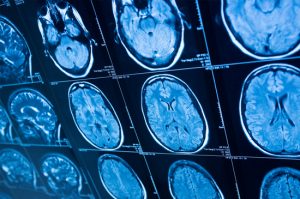 Epilepsy is a chronic neurological condition that is characterized by recurring seizures. The diagnosis is established when a person experiences two or more unprovoked seizures separated by at least 24 hours. The complex disorder affects people of all ages, races and ethnicities and can oftentimes be unpredictable. Some individuals with epilepsy have multiple seizures every day, and others can go years without having an episode.
Epilepsy is a chronic neurological condition that is characterized by recurring seizures. The diagnosis is established when a person experiences two or more unprovoked seizures separated by at least 24 hours. The complex disorder affects people of all ages, races and ethnicities and can oftentimes be unpredictable. Some individuals with epilepsy have multiple seizures every day, and others can go years without having an episode.
And while epilepsy is one of the most common neurological disorders in the U.S., for hundreds of years, the disease was shrouded in mystery and believed to be witchcraft or possession of evil spirits.
Today, the disease remains a mystery to scientists in many ways, but developments in technology have made it easier to study brain function and structure. Through these advances, remarkable progress is being made in the diagnosis and treatment of the more than 2.5 million people living with epilepsy in the U.S. Twice as many medications, for example, are available today than a decade ago, and seizure tracking has become effective and affordable through wearable technology.
Below are some recent developments and breakthroughs that are revolutionizing epilepsy care:
Wearables and Machine Learning are Helping Monitor Seizures
- The FDA recently cleared a wrist-worn wearable called the Embrace2. The technology, intended for children with epilepsy (ages 6 and up), sends alerts to a caretaker when a seizure is detected. The startup acknowledges its technology isn’t perfect but is continually refining the wearable and its algorithms with each new patient.
Source: https://www.allaboutcircuits.com/news/combating-epilepsy-with-wearables-and-machine-learning/
Inducing Epileptic Seizures Prior to Surgery May Reduce Hospital Stay
- Approximately 20 percent of epileptic patients require the insertion of electrodes directly into their brain. Those receiving this treatment often undergo cortical stimulation, a procedure which administers electrical current to induce seizures for better understanding of epileptic functioning.
- A current study is looking into whether inducing a seizure in preparing for surgery is as effective as waiting for a spontaneous seizure.
- According to the study’s results, induced seizures are seeing outcomes similar to the results observed with spontaneous seizures.
- “It’s not a new procedure, but the approach is new in the sense that now we know it’s very similar to a spontaneous seizure, so we can reduce hospital time. Instead of being in the hospital for two weeks, patients can maybe be there for 48 to 72 hours,” said Dr. Brigit Frauscher, lead researcher of the study, in a media release.
Deep Brain Stimulation May Help Treat Patients with Uncontrollable Epilepsy
- Many people manage their epilepsy through medication, but if medications fail, surgery is often presented as a treatment option to remove the abnormal part of the brain inducing seizures. In some cases, though, surgery isn’t a solution. Occasionally, the area that needs to be removed is vital to brain function, or the seizures are coming from multiple areas in the brain. Researchers, however, believe they’ve found a third treatment option: Deep Brain Stimulation (DBS).
- DBS modulates the brain, preventing reoccurring seizures. It involves placing a tiny pair of electrodes into an area of the brain that “seems to serve as a kind of switchboard for abnormal brain waves to spread throughout the brain.”
- In clinical trials, the DBS system reduced seizures by as much as 75 percent.
Source: https://newyork.cbslocal.com/2019/05/30/device-brain-epilepsy-seizures/
TSA Now Permits Some CBD Oil and Medications on Planes
- Following special instructions, a pediatric epilepsy drug containing cannabis can now be brought on board flights or placed in checked luggage.
Source: https://www.cnn.com/2019/05/27/politics/tsa-permits-epilepsy-drug-cannabis-flights/index.html
Epilepsy Foundation Launched a New Healthcare System to Improve Outcomes for People Living with Epilepsy
- Earlier this month, Epilepsy Foundation announced the launch of the Epilepsy Learning Healthcare System (ELHS), a collaboration designed to gather data about people with epilepsy from clinics throughout the U.S. and analyze it centrally to identify practices that lead to better outcomes.
- The data collected will include diagnosis, evaluation and care from healthcare providers, as well as information about seizure frequency, treatment side effects, self-management and quality of life from people with epilepsy and their caretakers.
EPI-HAB Supports Individuals Living with Epilepsy and Other Challenges
EPI-HAB provides meaningful employment opportunities for individuals with epilepsy and other challenges. Typical work focuses on hand labor skills, and employees are paid at or above minimum wage with flexible hours.
The 501(c) 3 organization is unique in that it does not solicit donations or charitable contributions, receive any grants – government or otherwise, nor does it conduct fundraisers. EPI-HAB operates and competes, for the most part, as a for-profit business.
Alongside the organization’s own efforts to increase the quality of life for Arizonans living with epilepsy and other challenges, EPI-HAB donates excess profits to charities like Phoenix Children’s hospital and the Epilepsy Foundation of Arizona to advance the study of epilepsy.
Last year, as part of its “Six Decades of Service” celebration, EPI-HAB presented a $10,000 check to Dr. Varina Boerwinkle of Phoenix Children’s hospital to support the global medical community leader’s research in targeting hard-to-treat tumors that cause epilepsy.

For more information about EPI-HAB, visit www.epihab.org.

